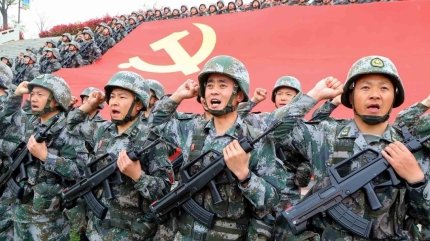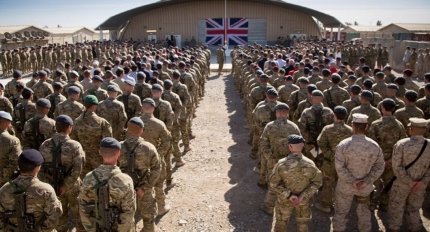Lord Robertson, the new major defence review, has described China as a "deadly" threat to the UK and NATO.
Points of attention
- The UK's strategic defence analysis will look deeper at the threat from Beijing.
- Great Britain plans to strengthen its respect for the armed forces to become a more reliable ally.
- He thinks everyone needs to be better prepared, integrated, and innovative in the face of growing threats worldwide.
- The UK government is developing a new transparent approach to national defence to combat international threats.
The UK Defence review will take a deeper look at the threat from Beijing
Lord Robertson, who served as NATO secretary general from 1999 to 2004, warned of a "deadly quartet of countries increasingly working together".
We and the NATO alliance, which met successfully last week, must be able to confront this particular quartet, as well as other problems that are permeating the world at the moment.

Lord Robertson
Former Secretary General of NATO
It should be noted that Robertson is one of three external experts engaged by the British Ministry of Defense to carry out a strategic defense analysis.
The others are Dr Fiona Hill, a former top White House Russia expert who testified during President Trump's impeachment hearings, and General Richard Barrons, a former chairman of the Joint Chiefs of Staff.
His remarks at the briefing suggest that this review of UK defence will take a deeper look at the threat from Beijing than previous versions, which have tended to focus on Russia.
John Hill, who will oversee the analysis, said the review of China's challenges would be part of a wider government effort.

Robertson's remarks, in which he referred to China, Iran, Russia and North Korea, went much further than a communique approved by NATO members at a summit last week that called China a "decisive factor" in Russia's war against Ukraine.
The previous government called Beijing a "systemic challenge" during the last central review, completed in 2021.
There is growing concern that Beijing presented itself as a moderating influence on Russia at the start of its war in Ukraine, but has shifted to a direct supporter of the Russian military effort.
The review, which will be completed in the first half of next year, will lead to "strengthening and respecting" the armed forces, Prime Minister Keir Starmer said.
Hill heralded a "new era for defence," saying his team of external reviewers would help the Defense Department "rethink” the capabilities it needs to become a "more trusted ally."
He ruled out any further cuts to the armed forces. Still, he did not comment on whether the government would outline a timetable for increasing defence spending from 2.3 per cent to 2.5 per cent of GDP, saying such details would be considered "in the future."
The UK Armed Forces must be more innovative
Hill said he believed there was an "untold story" about the economic impact defense could have on the UK. He said the review would ensure that defence is central to the country's future security, economic growth, and prosperity.
As we begin a new era for Britain, we need a new era for defence. A devastated armed force, wasteful procurement and sagging morale cannot last. At the same time, we must be acutely aware of the threats we face as the world becomes increasingly unstable and technology changes the nature of war, he said.

He said the armed forces needed to be "better combat-ready, more integrated and more innovative. What is needed is clearer accountability, faster delivery, less waste and better value for money".
The major and sectoral review, which puts NATO first, will consult with active military, veterans, members of parliament from all parties, industry and academia.
A defence Review Panel comprising senior, high-level experts from within and outside government will support the reviewers and engage with the defense community.
The Ministry of Defence accepts submissions from active and retired armed forces and allies members.
We live in a more dangerous and unstable world. My Government will develop a transparent new approach to our national defense that will help us tackle international threats while keeping the British people safe and secure. We will ensure that our battered armed forces are strengthened and respected, that defense spending is increased responsibly and that our country has the capabilities it needs to ensure Britain's long-term resilience, he said.
The review comes amid dire warnings about the state of Britain's military. General Patrick Sanders said last week that Britain's armed forces are so depleted that they can now only fight a small war for a month.




